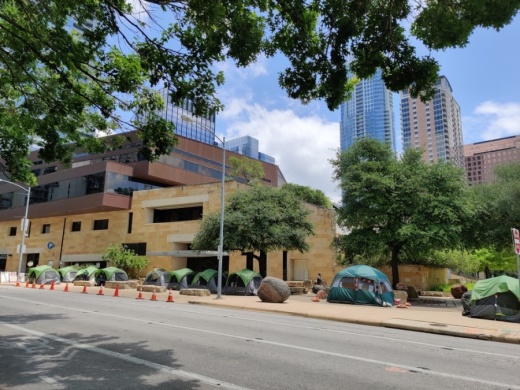City Council on May 18 was presented with a list of more than 40 city-owned properties—including numerous parks—that staff identified as preliminary candidates through the first stage of planning for sanctioned campgrounds. Staff are now in the process of refining and adding to that initial site list ahead of a presentation on the camping program's schedule, costs and other details due before council June 1, although an updated campsite listing may not be part of that briefing.
As that planning process moves forward, feedback from council and community members appears to have curbed consideration of some of the city's most heavily trafficked parks amid the search for usable locations. During a May 24 meeting of council's Health and Human Services Committee, Homeless Strategy Officer Dianna Grey said staff is broadening its search and will continue to target its list of finalists in response to resident concerns over park access. However, she said some less developed or isolated parkland could remain under review.
"I think the reality is that we simply don't have a ton of fantastic options," Grey said. "Staff will endeavor to certainly take into consideration all of the potential challenges or advantages of a particular site but anticipate that there may be some hard decisions ahead."
Despite the inclusion of popular facilities such as the Circle C Ranch, Walter E. Long and Roy G. Guerrero metropolitan parks on staff's preliminary list this month, Mayor Steve Adler also said officials had not intended for their eventual use in the city's sanctioned campsite plan.
"I don’t think that any of our colleagues were anticipating using park areas that were used by the public in any real material or substantial way," he said. "The conversation about parks really went to undeveloped park areas that might otherwise be available and accessible. ... No one, to my knowledge, was suggesting putting a sanctioned camp area in a park area where people were utilizing parks."
In addition to the local response to the city's preliminary site listings, the Texas Senate last week passed a bill centered on a statewide camping ban that requires state approval before cities can establish designated homeless campsites. It would also ban the use of parkland for such sites. Gov. Greg Abbott has not yet signed that measure into law, and Grey said staff will have to "contend with" the bill's parkland provision if it becomes effective.
Other considerations relating to public campgrounds now under review include health and safety standards and a possible partnership with Capital Metro to ensure transit connectivity to any final locations. Leading up to June 1, Grey said staff remains engaged in the site selection process while also developing cost and staffing frameworks as requested by council.
"I think obviously one question that we will need to answer is how we would resource this effort going forward, as well as, and related, what scale would we be looking at," she said. "We will be walking that delicate line ... around resourcing a crisis intervention that is relatively costly and doesn’t provide us permanent housing but really acknowledging that there is this very serious need for people to have some place to go that is designated by the city.”





